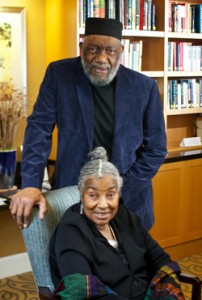UW luminaries fulfill lifelong dream by breaking barriers, giving back
 Thaddeus Spratlen and Lois Price Spratlen, University of Washington emeritus professors, broke down barriers across the US while raising the bar for women and people of color in higher education.
Thaddeus Spratlen and Lois Price Spratlen, University of Washington emeritus professors, broke down barriers across the US while raising the bar for women and people of color in higher education.
Thad, professor of marketing, paved the way for professors of color to join non-black universities and expanded access for other women and people of color in business by establishing the Business and Economic Development Center (BEDC), now called the Consulting and Business Development Center. He was the first African American faculty at the UW Foster School of Business, first to receive tenure and first emeritus professor. If he hadn’t pushed racial boundaries, the Consulting and Business Development Center might be a smaller program at a historically black college – and its impact might be far less.
Lois contributed to gender equality by writing the book on how women are treated in university settings. She also was the first female UW ombudsman. And in the 1950s she got a policy change for women nursing students to marry while in college.
Their $1 million lifetime gift to the UW ensures the Consulting and Business Development Center will flourish. To date, more than $85 million in new revenue was gained and more than 6,000 jobs were added or retained across Washington through the center’s work.
“The Foster School’s vision is to become the best public business school and to me that means we serve everyone. Foster is one of only three top public business schools in the nation to address minority business economic development,” says Michael Verchot, director of the Business and Economic Development Center. “Because of the Spratlen gift, we know right now that the Foster School Business and Economic Development Center will forevermore be working with small businesses in underserved communities.”
Serving minority-owned businesses
Thad started in the 1970s and 1980s at the University of Washington doing project-based learning to support minority-owned businesses. Then founded the center, one of the few centers of its kind to exist at a nationally ranked public university, in the 1990s.
Thad says, “You can do things as a center that would be more difficult to do, if you could do them at all, if it had remained a course of the business school or just a program. The center gives support for businesses, its board fellows, its MBA students and working with larger minority business owners through executive development.”
The center’s unique approach educates minority business owners while boosting their revenue. Thad says, “We developed the idea that we don’t show up as experts, do the study, leave you with the report. It’s a learning experience where we develop skills and knowledge in those who are assisted in the program. We take such pride in it and know that it’s a known quantity even beyond the helping save some jobs, creating some jobs, increasing sales. Those kinds of tangible things are part of the record of the center.” For 15 years, the Consulting and Business Development Center has assisted hundreds of minority-owned businesses with this approach.
Lois says, about the center, “It’s a tangible representation of a life’s work. Thaddeus started this a long time ago. It’s wonderful to know that it’s going to be here well after he’s gone and we’re gone.”
“His generation broke down all these barriers,” says Verchot.
Lois Price Spratlen, academic barrier-breaker
Lois was once denied admission to the University of Virginia in 1949, despite being valedictorian at her high school. Her neighbor helped her get scholarships to attend historically black Hampton University. “It changed my life,” says Lois.
In 1952, she pushed for a policy change at Hampton to allow students to be married while completing their degrees, an unprecedented event. “To have the nerve to go talk to the dean. I don’t know where I got it, but I did it,” says Lois. “It broke down the barrier.”
She went on to earn her bachelor’s in nursing (Hampton 1954), master’s in community mental health (UCLA 1972) and doctoral in urban planning (UW 1976).
Lois was a UW nursing professor for 30 years and named ombudsman for sexual harassment at UW, first higher education institution in the country to establish this office. She then became the first female ombudsman at the UW, changing the focus of the role from reacting to conflict to preventing it through community education. In 1998, Lois was named Ombuds of the Year by the California Caucus of College and University Ombuds.
“At the time that I served the university as the ombudsman for sexual harassment, we only had one case go to court. The one case that did go to court, we were able to use my educative approach and to win that case.”
From being denied admission to one nationally ranked university to becoming a leader at another one, Lois lived the civil rights dream.
UW laureate $1 million gift
The last chapter of the Spratlen legacy will live on through a bequest endowment primarily for the Consulting and Business Development Center. Through a lifetime of giving plus an estate gift, they enter an elite group of only a few hundred donors who are UW laureates, giving $1 million to the UW.
“It’s a wonderful legacy to be a part of,” says Thad. “It’s more important to think of the commitment to supporting something in the university that is really important. At the same time you’re showing an example to colleagues, to family and so on of just what can be accomplished.”
Lois agrees, “Anybody can do it. All you have to do is start small and give continuously. And you don’t have to have a million in the bank.”
